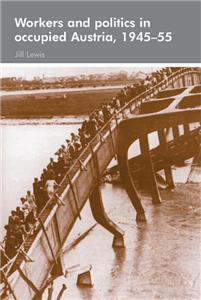Your Search Results
-
Promoted Content
-
Promoted ContentLiterature & Literary StudiesApril 2017
American literature and Irish culture, 1910–55
by Tara Stubbs
-
 Trusted Partner
Trusted Partner
-
 Trusted Partner
Trusted Partner
-
 Trusted Partner
Trusted Partner
-
 Trusted Partner
June 2023
Trusted Partner
June 202355 Fragen an die Seele
Wie sie tickt und was ihr Halt gibt
by Tanja Michael, Corinna Hartmann
-
 Trusted Partner
Trusted Partner
-
 Trusted Partner
Humanities & Social SciencesJanuary 2015
Trusted Partner
Humanities & Social SciencesJanuary 2015Workers and politics in occupied Austria, 1945–55
by Jill Lewis
In March 1946 Winston Churchill warned the world about the 'Iron Curtain' that had descended across Europe and behind which now lay, he said, the eight capitals of the ancient states of central and Eastern Europe. In fact, one of these eight, Vienna, escaped absorption into the Soviet bloc. Between 1945 and 1955, Austria and its capital were occupied by the Four (increasingly mutually antagonistic) Allied Powers. During this decade of confusion, insecurity, suspicion and fear, and confronted by poverty and the threat of famine, Austria's political and economic elites joined forces to promote a culture of political unity and harmony from which eventually emerged the Austrian model of corporatism, commonly referred to as the Social Partnership. This book sets the social and economic difficulties that Austria encountered in this crucial decade in their international context and examines how they were contained. The author also discusses the long-term implications of the Austrian culture of consensus, not only for the way in which the country dealt with its recent past, but also for present-day political developments. A remarkable study that will be essential reading for students and scholars of twentieth-century European history. ;
-
 Trusted Partner
Trusted Partner
-
 Trusted Partner
March 1988
Trusted Partner
March 19881986. Spiegelung in Mensch und Kosmos. Eranos. Volume 55
Herausgeber Rudolf Ritsema. Jahrbuch - Yearbook - Annales
by Rudolf Ritsema
-
 Trusted Partner
July 1986
Trusted Partner
July 1986Hans Dernschwam's Tagebuch einer Reise nach Konstantinopel und Kleinasien (1553/55).
Nach der Urschrift im Fugger-Archiv herausgegeben und erläutert von Franz Babinger.
by Epilog von Schnur, Roman; Herausgegeben von Babinger, Franz
-
 Trusted Partner
July 2014
Trusted Partner
July 2014Hans Dernschwam's Tagebuch einer Reise nach Konstantinopel und Kleinasien (1553/55).
Ins Neuhochdeutsche übersetzt von Jörg Riecke.
by Dernschwam, Hans / Herausgegeben von Babinger, Franz; Übersetzt von Riecke, Jörg
-
 Trusted Partner
Trusted Partner
-
 Trusted Partner
Trusted Partner
-
 Trusted Partner
Literature & Literary StudiesDecember 2018
Trusted Partner
Literature & Literary StudiesDecember 2018Five Elizabethan progress entertainments
by Leah Scragg, Paul Edmondson
Designed to introduce the student or general reader to a largely unfamiliar area of Elizabethan theatrical activity, Five Elizabethan progress entertainments focuses on a group of entertainments mounted for the monarch in the closing years of her reign. Richly annotated, and prefaced by a substantial introduction, the texts enable an understanding of the motives underlying not only the progress itself, but the choice of locations the monarch elected to visit and the personal and political preoccupations of those with whom she determined to stay. Selected for their diversity, the entertainments exhibit the tensions underlying some royal visits, the lavish expenditure entailed for the monarch's hosts and the overlap in terms of both material and authorship between the progress entertainments and the more widely studied products of the sixteenth-century stage.
-
 Trusted Partner
Literature & Literary StudiesFebruary 2021
Trusted Partner
Literature & Literary StudiesFebruary 2021Five Elizabethan progress entertainments
by Leah Scragg
Designed to introduce the student or general reader to a largely unfamiliar area of Elizabethan theatrical activity, Five Elizabethan progress entertainments focuses on a group of entertainments mounted for the monarch in the closing years of her reign. Richly annotated, and prefaced by a substantial introduction, the texts enable an understanding of the motives underlying not only the progress itself, but the choice of locations the monarch elected to visit and the personal and political preoccupations of those with whom she determined to stay. Selected for their diversity, the entertainments exhibit the tensions underlying some royal visits, the lavish expenditure entailed for the monarch's hosts and the overlap in terms of both material and authorship between the progress entertainments and the more widely studied products of the sixteenth-century stage.
-
 Trusted Partner
Business, Economics & LawJune 2025
Trusted Partner
Business, Economics & LawJune 2025Foundations of social ecological economics
The fight for revolutionary change in economic thought
by Clive L Spash
This book explores radical dissent from orthodox mainstream economics, and sets out a theoretically grounded vision for the emerging paradigm of social ecological economics. At the heart of this paradigmatic shift lies an acknowledgement of the inextricable embeddedness of economies in biophysical reality and social structure. The struggle for this transformative vision unfolds through a critical examination of mainstream environmental thought, followed by a nuanced evaluation of contributions from Marxists, socialists, critical institutionalists, feminists and Post-Keynesians grappling with the urgent environmental crisis. Synthesising insights from these diverse and heterodox schools, the book navigates the philosophical underpinnings of science, embracing a critical realist approach that challenges not only mainstream economic thought but also eclectic pluralism, relativism and strong constructionism. The question of what constitutes revolutionary science is explored in light of works by Kuhn, Schumpeter and Neurath, emphasising the pivotal role of values and ideology in works from Marx to Gramsci. Building on these radical and philosophical foundations, the book articulates a preanalytic vision of social ecological economics, dismantling entrenched notions of growth and efficiency in favour of a framework centered on social provisioning and needs embedded in ethics. In a thought-provoking conclusion, the book applies its analytical lens to the multiple crises of modernity within industrialised capital-accumulating economies. An agenda for social ecological transformation toward diverse alternative economies emerges, providing a compelling call to action in the face of contemporary challenges.
-
 Trusted Partner
July 2021
Trusted Partner
July 2021Strangeworlds - Die Reise ans Ende der Welt (Band 2)
Fantasy-Abenteuer, das dich in fremde Welten entführt
by L. D. Lapinski
-
 Trusted Partner
Trusted Partner
-
 Trusted Partner
Humanities & Social SciencesDecember 2003
Trusted Partner
Humanities & Social SciencesDecember 2003Luther's lives
by Elizabeth Vandiver, Ralph Keen, Thomas D. Frazel



























